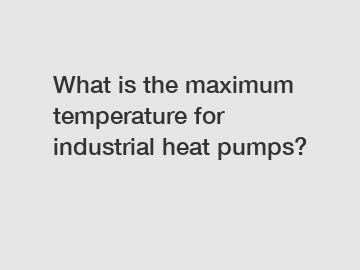What is the maximum temperature for industrial heat pumps?
Industrial heat pumps are essential tools used in a wide range of industries to transfer heat from one location to another. These devices are capable of reaching high temperatures, making them suitable for various industrial applications. However, there is a limit to how hot an industrial heat pump can get. In this article, we will explore the maximum temperature for industrial heat pumps and the factors that determine this limit.
Operating temperature range.
The maximum temperature that an industrial heat pump can reach depends on several factors, including the type of heat pump, the refrigerant used, and the design of the system. In general, industrial heat pumps can achieve temperatures ranging from 140°F to 500°F. However, some specialized heat pumps can reach even higher temperatures, up to 700°F or more.

Factors affecting maximum temperature.
Several factors influence the maximum temperature that an industrial heat pump can reach. The type of heat pump is a crucial factor, as different types of heat pumps have different temperature capabilities. For example, absorption heat pumps can reach higher temperatures than conventional heat pumps due to the use of high-grade energy sources such as natural gas or waste heat.
The refrigerant used in the heat pump also plays a significant role in determining the maximum temperature. Some refrigerants are more suitable for high-temperature applications than others, allowing the heat pump to operate at higher temperatures without compromising efficiency or safety.
The design of the heat pump system is another key factor that affects the maximum temperature. A well-designed system with high-quality components and efficient heat transfer mechanisms can operate at higher temperatures than a poorly designed system. Proper insulation, control systems, and maintenance also contribute to the overall temperature capabilities of an industrial heat pump.
Applications of high-temperature heat pumps.
Industrial heat pumps that can reach high temperatures are used in a variety of applications across different industries. These applications include but are not limited to:
- Chemical processing: High-temperature heat pumps are used in chemical processing plants to control temperatures during various chemical reactions and processes.
- Food processing: Industrial heat pumps are used in food processing facilities to pasteurize, sterilize, and cook food products at high temperatures.
- Metal processing: Heat pumps are used in metal processing plants to heat, cool, and maintain precise temperatures during metal fabrication and casting processes.
- Paper and pulp production: High-temperature heat pumps are used in paper and pulp mills to dry paper products and remove moisture from pulp.
- Waste heat recovery: Heat pumps are used to recover waste heat from industrial processes and convert it into useful energy for heating or cooling purposes.
Conclusion.
In conclusion, the maximum temperature for industrial heat pumps can vary depending on the type of heat pump, refrigerant used, and system design. While most industrial heat pumps can reach temperatures ranging from 140°F to 500°F, some specialized heat pumps can achieve even higher temperatures. These high-temperature heat pumps are essential for various industrial applications where precise temperature control is required. If you have any questions about industrial heat pumps or need assistance with selecting the right heat pump for your application, please feel free to contact us.
If you want to learn more, please visit our website pool heat pump calculator, R290 DC Inverter Heat Pump, small pool heat pump.


Comments
0